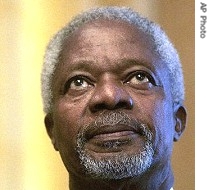-
(单词翻译:双击或拖选)
By Peter Heinlein
09 September 2006
 Kofi Annan |
||
-----
With the Security Council set to hold a debate on Darfur Monday, Secretary-General Annan expressed frustration1 that his attempts to persuade Sudanese leaders to accept U.N. troops in Darfur have failed. "I have been working with quite a few governments to try to get the government of Sudan to show flexibility2, but we have so far not been successful. The message I have tried to get to the Sudanese government is that the international community is not coming in as an invading force, but basically to help them protect the people. If the Government had been able to do it itself, I don't think we would be having this debate," he said.
Sudan's President Omar al-Bashir has sharply rejected any United Nations presence in Darfur, where war and disease have killed two-hundred thousand people and forced millions more to flee their homes over the past three and a half years.
A seven-thousand strong African Union force has tried with little success to halt violence in the vast region. But the A.U. force mandate3 expires at the end of September, and President Bashir has refused to allow the force to be strengthened and placed under U.N. command.
With the A.U. force in disarray4 and its future uncertain, Sudanese troops last month launched a major offensive in Darfur, believed to involve thousands of ground troops backed by aircraft.
With humanitarian5 aid workers reporting worsening conditions, Secretary-General Annan warned leaders in Khartoum Friday to accept blue-helmeted troops into Darfur or face the consequences. "The situation on the ground is serious, is desperate, and if they do not accept help, and the African Union has made it quite clear that they do not have the capacity to continue and they welcome a transition to the U.N., so if he denies the U.N. presence, discourages the African Union, and they leave, and the situation gets really desperate with thousands, even larger numbers, suffering or being killed. They are placing themselves in a situation where the leadership may be held collectively and individually responsible for what happens to the population in Darfur," he said.
The Darfur conflict began in early 2003 when rebels attacked government positions, complaining that the remote region remained undeveloped due to neglect by the government. Sudan is accused of responding by arming militias6 known as janjaweed to crush the rebellion, using a savage7 campaign of rape8 and murder - a charges the government denies.
The U.S. based group Human Rights Watch this week accused the Sudanese military of indiscriminate bombing in Darfur over the past few days.
 收听单词发音
收听单词发音
1
frustration

|
|
| n.挫折,失败,失效,落空 | |
参考例句: |
|
|
|
2
flexibility

|
|
| n.柔韧性,弹性,(光的)折射性,灵活性 | |
参考例句: |
|
|
|
3
mandate

|
|
| n.托管地;命令,指示 | |
参考例句: |
|
|
|
4
disarray

|
|
| n.混乱,紊乱,凌乱 | |
参考例句: |
|
|
|
5
humanitarian

|
|
| n.人道主义者,博爱者,基督凡人论者 | |
参考例句: |
|
|
|
6
militias

|
|
| n.民兵组织,民兵( militia的名词复数 ) | |
参考例句: |
|
|
|
7
savage

|
|
| adj.野蛮的;凶恶的,残暴的;n.未开化的人 | |
参考例句: |
|
|
|
8
rape

|
|
| n.抢夺,掠夺,强奸;vt.掠夺,抢夺,强奸 | |
参考例句: |
|
|
|















